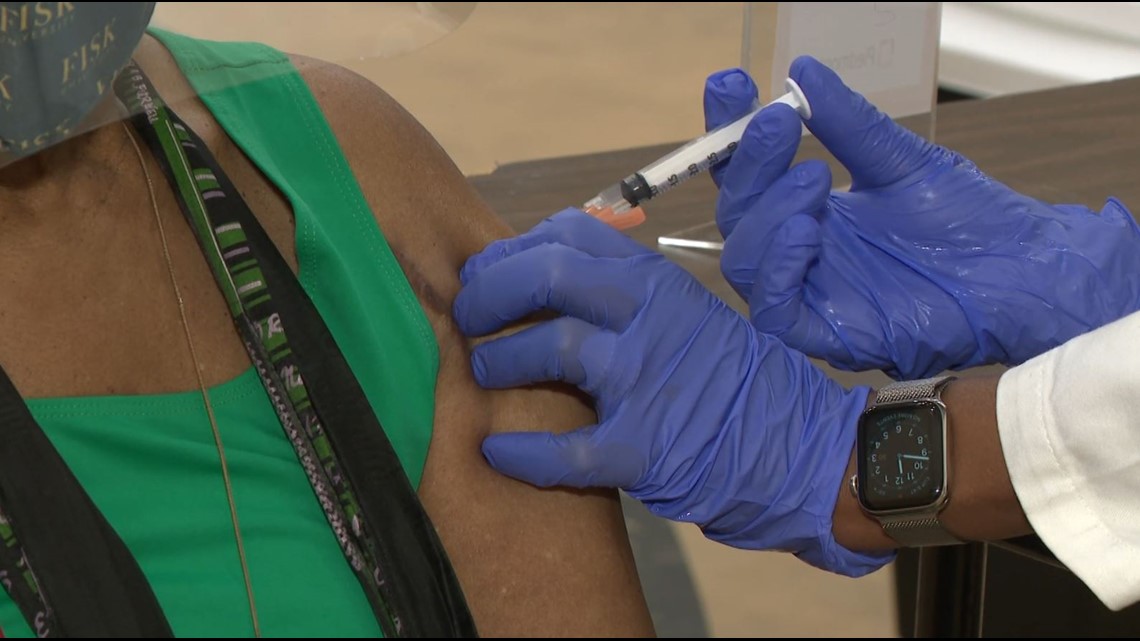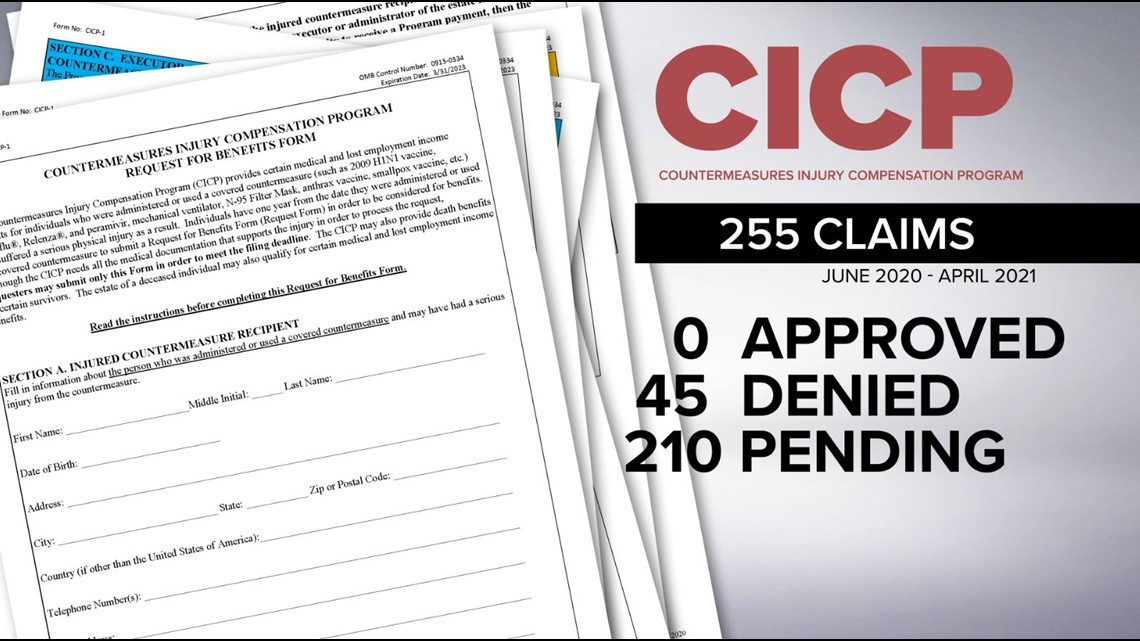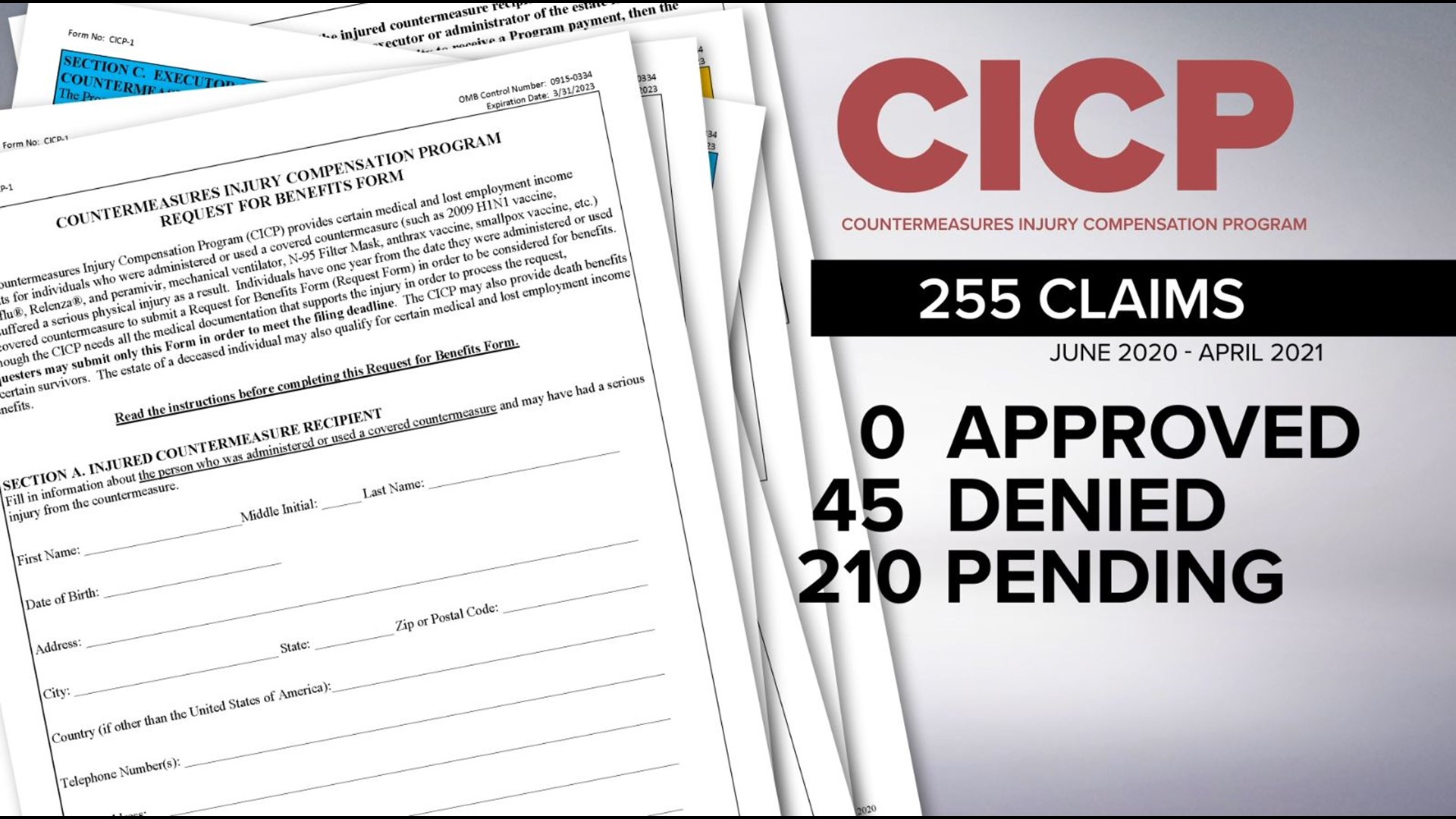ATLANTA — “They're almost like an epileptic seizure, except I'm completely alert,” said Kristi Simmonds, who started battling tremors several days after receiving her first COVID-19 vaccine injection.
Roger Loiselle struggles to lift his right arm.
“The pain was ridiculous. To even get something to drink, I had to hold my wrists with the other hand,” he explained.
Loiselle also believes his injury is vaccine related. But for him, it was how the shot was given, an injury known as SIRVA, shoulder injury related to vaccine administration. SIRVA is most commonly associated with the flu shot and can range from muscle weakness and pain, to a torn rotator cuff if not diagnosed properly.
“When they did the first one, I thought to myself, OK, that seemed pretty high. It was more up into the shoulder area,” Loiselle said.
Both could qualify for Countermeasures Injury Compensation Program (CICP). It’s a long, clunky name for a federal program that reimburses medical costs and lost wages for injuries associated with a treatment offered during a national emergency.
In this case, that emergency is COVID-19.


What the data says
The CICP was first used in 2009 with H1N1. About 90 million people received that vaccine. COVID-19 has easily surpassed that number.
Doctor Vito Caserta helped create the CICP and served as director until his retirement. He says the program isn’t just about vaccine, but also injuries from the drugs or ventilators used as treatment.
“If they get put on a ventilator and somebody set the settings a little too high and then they have a pneumothorax where the lung collapses and all these complications, well, then maybe they have a claim,” Dr. Caserta explained.
But critics warn it’s not that easy.
Since the program started a decade ago, 701 claims have been filed. Only six percent approved. That’s just 39 cases, most for injuries associated with the H1N1 vaccine. Three were connected to the smallpox vaccine.
There is no historical data posted publicly on when claims were filed and for what, just a monthly data snapshot.
11Alive's investigative team, The Reveal, started tracking those posts in June 2020. Since then, 255 new claims have been filed. None have been approved. 45 claims have been denied, some likely from before the pandemic. 210 claims are still pending medical review.


“The way Congress wrote the law that created the program, the evidence needs to be compelling and compelling is a high level of evidence,” Dr. Caserta said.
The Reveal has tried for seven months to get information on the types of injuries alleged, and why so many claims were denied. We’re still waiting.
“There is so little transparency to it, you know, I think you've put your finger on one of the major problems of this coronavirus vaccine injury compensation program, it is tremendously secretive,” said Peter Meyers, a retired George Washington University Law School professor.
Meyers made his own public records requests and did receive several responses, offering insight into the first 48 COVID-19 related claims filed. About half of the claims involve the vaccine. Nine relate to the use of a ventilator. Among the top injuries claimed – allergic reactions and death.
Meyers says the real story in the data is how few claims have been submitted.
“If the Biden administration wants to get the trust of the American people… to counter this hesitancy among millions of Americans to getting vaccinated, you would think that they would adopt an open and more forthcoming perspective,” Meyers said.
Some of the claims seem absurd on their surface - like a shoulder injury from putting on a face mask, or even attempted murder.
READ | CICP Vaccine Injury Report
“That's OK, because, you know, it may turn out that wearing a mask causes psychiatric issues in certain people and so it may be a valid claim. Put in your request for benefits,” Caserta explained.
Dr. Caserta says people shouldn’t be alarmed by the number of cases waiting on medical review. He expects that number to grow as the people processing the claims wait to see what the science shows as possible outcomes.
“There's a lag for the science. It takes time. You know, even with the H1N1, it took time for us to develop the science that Guillain-Barre was truly a result, sometimes rarely of that vaccine," Dr. Caserta said.
But without more transparency, Meyers says the program is fundamentally flawed. Claimants never get a hearing, there’s no compensation for pain and suffering, or reimbursement if you hire an attorney to help with the forms.
According to the data obtained by The Reveal, of the 39 claims approved, only 29 had expenses eligible for reimbursement. The most common injury in those cases, was Guillain-Barre syndrome. The other injuries to receive compensation were anaphylaxis, shoulder pain, bursitis and one death.
Meyers says clearly, some people need an attorney to assist. Of the initial COVID-19 claims, the CICP couldn’t determine what countermeasure caused the alleged injury in nearly 20% of the cases.
“No lawyer would ever file a petition that was so obscure and so, you know, unintelligible that the agency cannot even figure out what is it, the vaccine or what are you complaining about,” Meyers said.
Where do you go from here?
There is another injury program that will pay pain and suffering related to complications from vaccine, but right now the products being manufactured by Moderna, Pfizer, and Johnson & Johnson are not part of it.
Dr. Caserta says for the COVID-19 vaccine to be put into the VICP, as it's called, the vaccine currently being administered under an emergency use authorization would have to be approved for routine administration in children. Caserta says that’s two layers of authorization that will take months, if not years.
Still, some say they’re holding out, hoping the process will move faster. If you’re one of them, the CICP warns you only have one year from the date of your injury to file a claim and the CICP is the only program that will consider claims related to COVID-19 injuries beyond vaccine.
Simmonds knows severe reactions are rare and it's unclear, outside of timing, how doctors will prove her seizures are related to the vaccine. But while science does the research, she believes the government must be passionate about helping those potentially injured.
“It should be a simple, you know, cut and dry issue,” Simmonds said.
She hasn’t been able to return to work since getting the vaccine in late January. She says her only income is the money raised through a GoFundMe set up by her sister.
She has yet to file a claim with the CICP; neither has Loiselle. He says his arm is slowly starting to feel better.
“I have complete, you know, range of motion with my left. On my right (arm) it's totally different. I mean, it's pulling in my neck, my shoulder down my arm. But at least I'm able to do things," Loiselle said.
Despite his injury, Loiselle did go back for his second shot and says that dose was uneventful. He says he never lost confidence in the vaccine itself.
“We figured to go overseas, we're going to have to have some proof that we've been vaccinated. We were eager to do it,” Loiselle explained.
But Loiselle does question how eager the government will be to stand by those injured trying to get through this pandemic.
The Reveal is an investigative show exposing inequality, injustice, and ineptitude created by people in power throughout Georgia and across the country.

